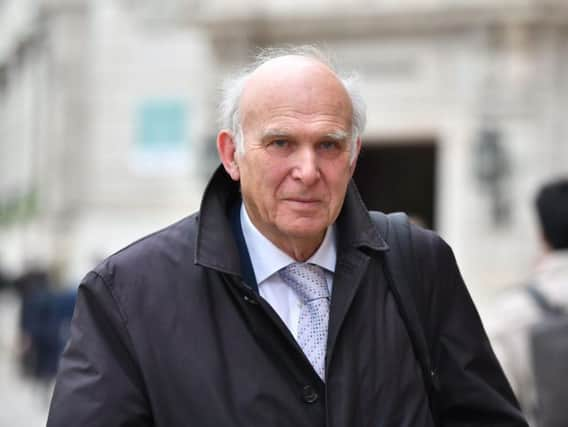A judge must lead a review of the 'punitive' loan charge, says Sir Vince Cable


Read more:
Sir Vince has written to the Chancellor Sajid Javid calling on him to pause the loan charge. Sir Vince claims the charge is unfair, retrospective and poses a suicide risk. Sir Vince said there was “significant support” on all sides of the House of Commons for a review that could summon witnesses from public, Government and private bodies.
Advertisement
Hide AdAdvertisement
Hide AdHe calls on the Chancellor to explain any opposition he might have to a review.
The charge was introduced in response to the Treasury’s concerns about “disguised remuneration schemes” which involved individuals being paid through loans, usually via an offshore trust in a low or no tax jurisdiction, which they did not have to repay.
According to the Treasury, the loan charge means people paying themselves through loans will have to contribute their “fair share” to pay for public services.
The All-Party Parliamentary Loan Charge Group (APPG) argues that the charge is retrospective and overrides taxpayer protections - claims which have been rejected by the Treasury.
Advertisement
Hide AdAdvertisement
Hide AdWorkers including locum doctors and nurses have been hit with large, unexpected tax bills dating back to 1999.
In his letter to Mr Javid, Sir Vince said: “While I do not support tax avoidance, I am against the Government’s plan to tax retrospectively people who took part in employee benefit trust loan plans which at the time were not illegal and there was no reason to believe any relevant legislation was in train.
“I support efforts to close loopholes and as Business Secretary introduced measures to help clamp down on tax avoidance by introducing a public register of beneficial ownership.
Sir Vince’s letter continues: “However, this is a punitive measure and - particularly because it extends 20 years back - it is unfair. The legislation primarily targets the individuals rather than the advisers and companies that sold or encouraged the schemes (several of whom it would be difficult to pursue as they are either offshore or no longer exist).
Advertisement
Hide AdAdvertisement
Hide Ad“The impact is substantial for many of the affected families and settling with HMRC would be life-changing. They are contractors and freelances who do not have regular protections and benefits such as holiday and sick pay or pension contributions and are more financially vulnerable.
“There have been accounts of HMRC aggressively pursuing people, putting significant pressure on individuals. Despite HMRC’s insistence that they do not intend to bankrupt individuals, the reality is that many are facing bankruptcy, insolvency or the loss of their home to settle the debt which includes penalties and interest.
“As a result many (a recent poll suggests as many as 40 per cent) are contemplating suicide..If the arrangements were as your department has argued, always illegal, why was it necessary to enact new legislation? And if tax was liable, why was HMRC, unable to show that in an enquiry?”
Sir Vince said an independent review is necessary, “particularly because of the risk of further suicides, and the considerable impact on people’s lives in the form of bankruptcies, damage to livelihoods and loss of homes.”
Advertisement
Hide AdAdvertisement
Hide AdA government spokesperson said recently: “The loan charge is designed to tackle tax avoidance and ensure everyone pays their fair share. It builds on more than two decades of HMRC action to challenge these schemes.
“The PM and his team of ministers will be setting out more details on their planned policy agendas over the next few weeks and months. As always, decisions on tax are for the Chancellor to announce at fiscal events.”
A Treasury report into the loan charge said: “The Government considers that the rationale for this charge is clear and robust, and has been consistently clear there is no intention to change the relevant legislation which has been enacted by Parliament.”
An HMRC spokesperson said recently: “HMRC is committed to treating all those we serve with respect and consideration
Advertisement
Hide AdAdvertisement
Hide Ad“We have committed to giving people as long as they need to pay the loan charge as we completely understand that facing a large tax bill can be difficult and stressful.
“Our teams are trained to identify customers who are anxious, worried or need extra support and ensure they get the help they need.”